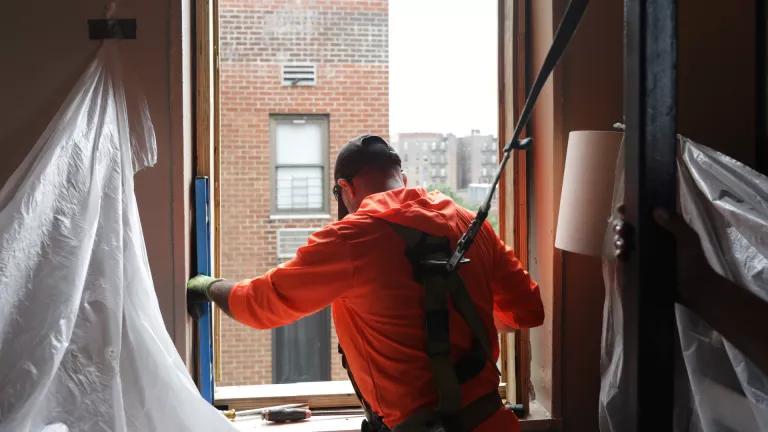Clean Trucks Rules Are NJ’s First Step
By adopting the Advanced Clean Trucks (ACT) rule—which requires an increasing number of zero-emission truck sales each year in the state—New Jersey took a major step to reduce harmful air pollution.

Brielle Stander is a contributing author for this blog.
By becoming the first state on the East Coast to adopt the Advanced Clean Trucks (ACT) rule—which requires an increasing number of zero-emission truck sales each year in the state—New Jersey took a major step to reduce harmful air pollution.
However, additional complementary actions are needed to target zero-emission vehicle (ZEV) benefits to overburdened communities that suffer a disproportionate share of transportation pollution and are often communities of color and low-income communities. This includes, among other things, adopting the Heavy-Duty Omnibus (HDO) rule and fleet purchase requirements, as well as programs that focus zero-emission zones in these communities, incentive programs for targeted ZEV deployment, and mandates that focus of emissions reduction measures in environmental justice communities.
This announcement comes on the heels of other New Jersey programs that will help to ensure that clean trucks and buses are running on our roads for decades to come. Recently, the state announced expansion of the NJ Zero Emission Incentive Program, which helps to offset the higher upfront costs of electric trucks and buses. Additionally, the Board of Public Utilities is working to provide guidance to the state’s utilities to support the expansion of the state’s electric truck and bus infrastructure.
The Garden State Needs Clean Air
The largest emitting sector of climate pollution in New Jersey is the transportation sector, with commercial trucks making up a disproportionate share of health-harming emissions. The Garden State has set an ambitious goal of reducing emissions by 80 percent by 2050, and therefore needs additional comprehensive policies to ensure clean air and improved health for all residents. A recent study by MJ Bradley and Associations shows that New Jersey adopting the ACT will have a monetized health value of $994 million dollars.
From Dirty Trucks to a Clean Economy
The ACT rule helps New Jersey speed away from dirty fossil fuels and focus on the clean transportation economy. Importantly, ZEVs are projected to have lower lifetime maintenance costs than the diesel and gasoline vehicles they are replacing. Under the ACT Rule, by 2050 annual net societal benefits are estimated to be $1.1 billion, including $446 million in net fleet savings and $70 million in utility net revenue. Cumulative estimated societal net benefits total $10.8 billion between 2020 and 2050. And total benefits almost double if the state adopts the HDO rule.
Clean Trucks, Healthy Communities
Commercial trucks and buses in New Jersey total less than 10 percent of all of the vehicles on the road but they are responsible for 44 percent of the emissions of nitrogen oxides (NOx) and 39 percent of particulate matter leading these vehicles to cause a large adverse public health impact on New Jerseyans. Reducing these emissions is beneficial for New Jersey, its neighbors, and the rest of the county. The leadership of New Jersey and other states, such as Oregon, Washington, adds momentum to the burgeoning zero emission vehicle industry, but we still need other state and federal policies to adopt strict ZEV mandates and vehicle emission standards.
Looking Forward
Now that New Jersey has guaranteed minimum supply of ZEVs, additional policies are needed to direct benefits to EJ communities and accelerate the transition to 100% ZEVs. New Jersey next big opportunities involve adopting the HDO rule, fleet purchase requirements, and charging infrastructure buildout. Further, investments from the federal Infrastructure Investment and Jobs Act should target ZEV deployment where they can make the biggest impact on the health and livelihoods of surrounding communities. Now, it is vital that other states move forward with clean transportation policies to maximize the benefits to air quality and residents' health.



